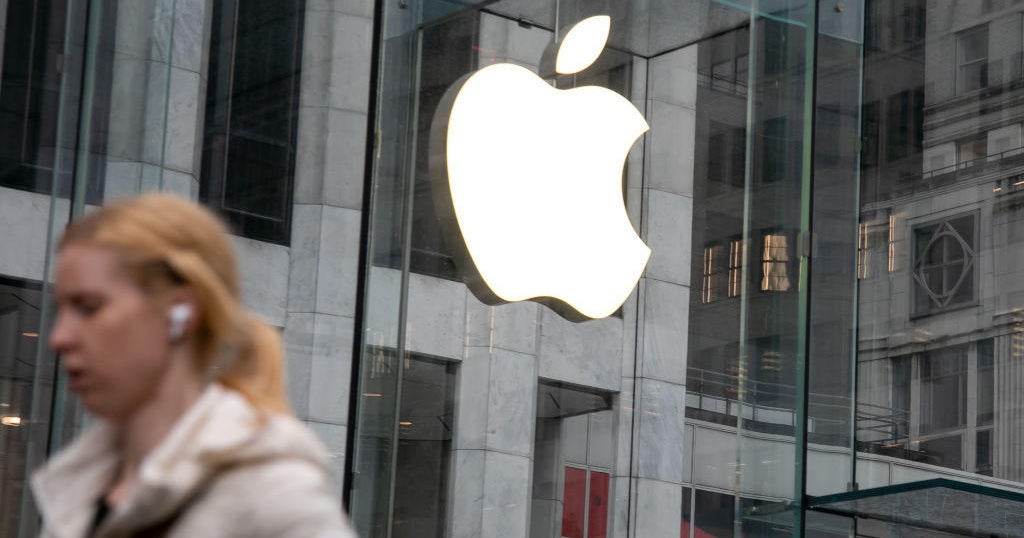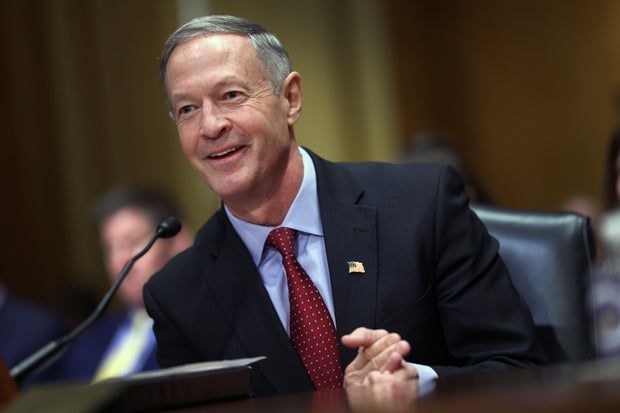CBS News
Berkshire Hathaway has first annual meeting since death of longtime vice chairman Charlie Munger

Warren Buffett’s Berkshire Hathaway gathered for its first annual meeting in an Omaha arena on Saturday, bringing together shareholders for the first time since the death of longtime vice chairman and right-hand man Charlie Munger.
Tens of thousands of shareholders filled the arena eager to vacuum up tidbits of wisdom from billionaire Buffett, who famously dubbed the meeting “Woodstock for Capitalists” and to pay tribute to Munger, who died at 99 in November.
The meeting opened with a video tribute to Munger recounting his life and highlighting some of his best known quotes from the meetings over the years that drew applause, including classic lines like “If people weren’t so often wrong, we wouldn’t be so rich.” The video also featured old interviews with Buffett and Munger talking about their epic friendship.
The video also featured several of the classic skits the investors made for meetings over the years with holiday stars like a “Desperate Housewives” spoof where one of the women introduced Munger as her boyfriend and another video where Jamie Lee Curtis swooned over Munger.
As the video ended, everyone in the arena gave Munger a prolonged standing ovation to thank him for being what Buffett called “the architect of Berkshire Hathaway.”
Rebecca S. Gratz / AP
For decades, Munger shared the stage with Buffett every year for the marathon question and answer session that is the event’s centerpiece. Munger routinely let Buffett take the lead with expansive responses that went on for several minutes. Then Munger himself would cut directly to the point. He is remembered for calling cryptocurrencies stupid, telling people to “marry the best person that will have you” and comparing many unproven internet businesses in 2000 to “turds.”
He and Buffett functioned as a classic comedy duo, with Buffett offering lengthy setups to Munger’s witty one-liners. Together, they transformed Berkshire from a floundering textile mill into a massive conglomerate made up of a variety of interests, from insurance companies such as Geico to BNSF railroad to several major utilities and an assortment of other companies.
Munger often summed up the key Berkshire’s success as “trying to be consistently not stupid, instead of trying to be very intelligent.” He and Buffett also were known for sticking to businesses they understood well.
“Warren always did at least 80% of the talking. But Charlie was a great foil,” said Stansberry Research analyst Whitney Tilson, who was looking forward to his 27th consecutive meeting with a bit of a heavy heart because of Munger’s absence.
That absence, however, may well create space for shareholders to get to know better the two executives who directly oversee Berkshire’s companies: Ajit Jain, who manages the insurance units, and Greg Abel, who handles everything else. Abel will one day replace the 93-year-old Buffett as CEO. Abel and Jain are sharing the main stage with Buffett for the first time this year in the spot Munger used to occupy.
The first time Buffett kicked a question to Abel, he mistakenly said “Charlie?” out of habit.
Morningstar analyst Greggory Warren said he hopes Abel will speak up more this year and let shareholders see some of the brilliance Berkshire executives talk about. Ever since Munger let it slip at the annual meeting three years ago that Abel would be the successor, Buffett has repeatedly reassured investors that he’s confident in the pick.
Berkshire Hathaway remains successful amid drop in earnings
Buffett’s company reported a steep drop in earnings because the paper value of its investments fell and it sold off part of its massive Apple stake, but overall, Berkshire Hathaway’s many businesses performed well.
Berkshire reported a $12.7 billion profit, or $8,825 per Class A share, in the quarter. That’s roughly one-third of the $35.5 billion, or $24,377 per A share, that Berkshire reported a year ago.
But those figures were heavily swayed by a large drop in the paper value of Berkshire’s investments. That’s why Buffett encourages investors to pay more attention to the conglomerate’s operating earnings that exclude the investment figures. By that measure, Berkshire’s operating earnings jumped 39% to $11.222 billion from last year’s $8.065 billion as its insurance companies led a strong performance.
The three analysts surveyed by FactSet Research had predicted operating earnings of $6,701.87 per Class A share.
Buffett did sell off nearly $6 billion in stocks during the quarter, including trimming about 13% of Berkshire’s massive Apple stake. The investment in the iPhone maker is still the biggest one in the $364 billion portfolio at $135.4 billion, and Buffett said he expects Apple to remain the biggest investment for years — even up to when his successor takes over.
But the estimated value of Berkshire’s Apple stake suggests that Buffett sold off more than 100 million shares. Buffett has said he invested in Apple’s stock because of how devoted consumers are to the iPhone and other Apple products.
Apple CEO Tim Cook, who is at the Berkshire meeting, told CNBC that he still considers it a privilege to have Berkshire as a major shareholder, and he knew about the sales before Berkshire disclosed them Saturday.
Berkshire reported a $2.6 billion underwriting profit at its insurers, up from $911 million a year ago.
BNSF railroad’s profits did disappoint and drop 8% to $1.143 billion, but most of its many other companies delivered solid results, including a 72% jump in operating profits at the utility unit that added $717 million to Berkshire’s total.
Berkshire’s revenue grew 5% to $89.87 billion in the quarter. The two analysts who reported estimates to FactSet predicted $87.044 billion revenue.
With no major acquisitions in sight, Berkshire’s massive cash pile continued to grow to a record $188.993 billion in the quarter. Berkshire even spent $2.6 billion repurchasing shares during the first three months of the year, but its companies include Geico insurance, BNSF railroad, several major utilities and an assortment of dozens of others keep generating mountains of cash.
“We’d love to spend it but we won’t spend it unless we’re doing something with very little risk that will make us a lot of money,” Buffett said.
CBS News
Health insurers limit coverage of prosthetic limbs, questioning their medical necessity

When Michael Adams was researching health insurance options last year, he had one very specific requirement: coverage for prosthetic limbs.
Adams, 51, lost his right leg to cancer 40 years ago, and he has worn out more legs than he can count. He picked a gold plan on the Colorado health insurance marketplace that covered prosthetics, including microprocessor-controlled knees like the one he has used for many years. That function adds stability and helps prevent falls.
But when his leg needed replacing in January after about five years of everyday use, his new marketplace health plan wouldn’t authorize it. The roughly $50,000 leg with the electronically controlled knee wasn’t medically necessary, the insurer said, even though Colorado law leaves that determination up to the patient’s doctor, and his has prescribed a version of that leg for many years, starting when he had employer-sponsored coverage.
“The electronic prosthetic knee is life-changing,” said Adams, who lives in Lafayette, Colorado, with his wife and two kids. Without it, “it would be like going back to having a wooden leg like I did when I was a kid.” The microprocessor in the knee responds to different surfaces and inclines, stiffening up if it detects movement that indicates its user is falling.
Alana Adams
People who need surgery to replace a joint typically don’t encounter similar coverage roadblocks. In 2021, 1.5 million knee or hip joint replacements were performed in United States hospitals and hospital-owned ambulatory facilities, according to the federal Agency for Healthcare Research and Quality, or AHRQ. The median price for a total hip or knee replacement without complications at top orthopedic hospitals was just over $68,000 in 2020, according to one analysis, though health plans often negotiate lower rates.
To people in the amputee community, the coverage disparity amounts to discrimination.
“Insurance covers a knee replacement if it’s covered with skin, but if it’s covered with plastic, it’s not going to cover it,” said Jeffrey Cain, a family physician and former chair of the board of the Amputee Coalition, an advocacy group. Cain wears two prosthetic legs, having lost his after an airplane accident nearly 30 years ago.
AHIP, a trade group for health plans, said health plans generally provide coverage when the prosthetic is determined to be medically necessary, such as to replace a body part or function for walking and day-to-day activity. In practice, though, prosthetic coverage by private health plans varies tremendously, said Ashlie White, chief strategy and programs officer at the Amputee Coalition. Even though coverage for basic prostheses may be included in a plan, “often insurance companies will put caps on the devices and restrictions on the types of devices approved,” White said.
That means that a patient’s costs can also fluctuate significantly, depending on that person’s coverage specifics, the plan’s restrictions and even geographic cost differences.
An estimated 2.3 million people are living with limb loss in the U.S., according to an analysis by Avalere, a health care consulting company. That number is expected to as much as double in coming years as people age and a growing number lose limbs to diabetes, trauma and other medical problems.
Fewer than half of people with limb loss have been prescribed a prosthesis, according to a report by the AHRQ. Plans may deny coverage for prosthetic limbs by claiming they aren’t medically necessary or are experimental devices, even though microprocessor-controlled knees like Adams’ have been in use for decades.
Cain was instrumental in getting passed a 2000 Colorado law that requires insurers to cover prosthetic arms and legs at parity with Medicare, which requires coverage with a 20% coinsurance payment. Since that measure was enacted, about half of states have passed “insurance fairness” laws that require prosthetic coverage on par with other covered medical services in a plan or laws that require coverage of prostheses that enable people to do sports. But these laws apply only to plans regulated by the state. Over half of people with private coverage are in plans not governed by state law.
The Medicare program’s 80% coverage of prosthetic limbs mirrors its coverage for other services. Still, an October report by the Government Accountability Office found that only 30% of beneficiaries who lost a limb in 2016 received a prosthesis in the following three years.
Cost is a factor for many people.
“No matter your coverage, most people have to pay something on that device,” White said. As a result, “many people will be on a payment plan for their device,” she said. Some may take out loans.
The federal Consumer Financial Protection Bureau has proposed a rule that would prohibit lenders from repossessing medical devices such as wheelchairs and prosthetic limbs if people can’t repay their loans.
“It is a replacement limb,” said White, whose organization has heard of several cases in which lenders have repossessed wheelchairs or prostheses. Repossession is “literally a punishment to the individual.”
Adams ultimately owed a coinsurance payment of about $4,000 for his new leg, which reflected his portion of the insurer’s negotiated rate for the knee and foot portion of the leg but did not include the costly part that fits around his stump, which didn’t need replacing. The insurer approved the prosthetic leg on appeal, claiming it had made an administrative error, Adams said.
“We’re fortunate that we’re able to afford that 20%,” said Adams, who is a self-employed leadership consultant.
Again, out-of-pocket costs – even if the patient has health insurance and a doctor’s prescription – can be cost-prohibitive because of the plan’s co-insurance requirements as well as coverage caps or other limitations.
Leah Kaplan doesn’t have that financial flexibility. Born without a left hand, she did not have a prosthetic limb until a few years ago.
Growing up, “I didn’t want more reasons to be stared at,” said Kaplan, 32, of her decision not to use a prosthesis. A few years ago, the cycling enthusiast got a prosthetic hand specially designed for use with her bike. That device was covered under the health plan she has through her county government job in Spokane, Washington, helping developmentally disabled people transition from school to work.
But when she tried to get approval for a prosthetic hand to use for everyday activities, her health plan turned her down. The myoelectric hand she requested would respond to electrical impulses in her arm that would move the hand to perform certain actions. Without insurance coverage, the hand would cost her just over $46,000, which she said she can’t afford.
Working with her doctor, she has appealed the decision to her insurer and been denied three times. Kaplan said she’s still not sure exactly what the rationale is, except that the insurer has questioned the medical necessity of the prosthetic hand. The next step is to file an appeal with an independent review organization certified by the state insurance commissioner’s office.
A prosthetic hand is not a luxury device, Kaplan said. The prosthetic clinic has ordered the hand and made the customized socket that will fit around the end of her arm. But until insurance coverage is sorted out, she can’t use it.
At this point, she feels defeated. “I’ve been waiting for this for so long,” Kaplan said.
KFF Health News is a national newsroom that produces in-depth journalism about health issues and is one of the core operating programs at KFF — the independent source for health policy research, polling and journalism.
CBS News
DNC chair candidate Martin O’Malley says Democrats need to learn from “very bad loss”

Kevin Dietsch / Getty Images
Martin O’Malley has the kind of experience that would typically benefit a Democrat who wants to guide the party’s future after devastating losses in the last election.
He’s a former governor, former mayor and a 2016 presidential candidate who until recently was serving in President Joe Biden’s administration. Yet O’Malley is facing a difficult path in the race to try and become the next chairman of the Democratic National Committee as the party reckons with the reality that key pockets of voters turned against it.
Vital to O’Malley’s attempt is a campaign platform, first reported by CBS News, that calls for reconnecting the Democratic Party “to the kitchen table of every American family.”
“We suffered a very bad loss,” O’Malley said in an interview, urging Democrats “to learn from it in order to win the next battles ahead.”
His vision is centered on a 57-state and territory strategy along with plans to give campaigns “world-class AI tools for voter outreach, research, communications, and financial management, eliminating barriers to effective campaigning.” O’Malley’s pitch is also focused on “re-investing in direct voter registration,” as part of his pledge for the party to make “voter protection and registration the pillars of the change we need to win.”
Democrats weathered a chaotic election cycle in 2024, punctuated by the push within the party to convince President Biden to end his reelection run after a dismal debate performance in June. While Mr. Biden eventually ended his bid in July and endorsed Vice President Kamala Harris to take his place at the top of the ticket, the 107-day sprint that followed resulted in Democrats losing the White House and Senate while failing, albeit narrowly, to win control of the House.
Now the party is essentially leaderless and preparing for an emboldened Donald Trump to return to Washington, where he’ll be able to benefit from Republicans’ unified control of Congress and the White House. Those dynamics will be well in play at the time of the election for DNC chair on Feb. 1 given the unease among Democrats that has been abundantly clear in the weeks following the presidential election.
“I want to see someone who doesn’t come from the Washington circuit, who actually has been out there in the tissue of the country,” Ohio Rep. Marcy Kaptur, a battleground district Democrat, said of the DNC chair race.
Failure can mean opportunity. The party’s struggles means O’Malley, as well as other ambitious Democrats, have a chance to become the next chair and carry wide ranging influence during a critical time for the party as it looks to regain ground in the 2026 midterms and the 2028 presidential election. For all his apparent vulnerabilities, Trump was far more successful in this election than ever before, winning all seven presidential battlegrounds. Whether what happened in 2024 will become a tangible turning point for Democrats is likely to loom over the chair race in the coming weeks.
“That’s the big shift that’s happened with this election going the wrong way on us,” O’Malley said. “We’re now in a mode of needing a changemaker, not a caretaker.”
Among those running for chair, Ken Martin, the leader of Minnesota’s arm of the Democratic Party and a DNC vice chair, as well as Wisconsin Democratic Party Chair Ben Wikler, are seen as frontrunners. Martin has deep relationships within the DNC and can boast a statewide winning streak for candidates in Minnesota, while Wikler carries the political gravitas of helping lead the party in one of the nation’s seven presidential battlegrounds.
Earlier this month, Martin announced a framework which includes his drive for a “Democratic infrastructure in all 3,244 counties,” across the country, as well as taking on the branding problem evident from the 2024 election results.
“The majority of Americans now believe the Republican Party best represents the interests of the working class and the poor, and the Democratic Party is the party of the wealthy and the elites,” Martin said in his framework. “It’s a damning indictment on our party brand. We must be willing to dig deep and recenter the Democratic agenda to unite families across race, age, background, and class.”
During a brief pitch to party leaders at a meeting in Washington D.C. last week where Martin and O’Malley also spoke, Wikler told his fellow Democrats “we need to build the battle plan to change how we communicate, so we show what we mean when we say we fight for working folks.”
This isn’t the first time O’Malley has been linked to leading the party. Days after the 2016 election, he posted on social media that despite encouragement, he would not run for chair. Eight years later, he’s navigating a short window to make his case as he emphasizes his lengthy career in politics.
O’Malley served as mayor of Baltimore from 1999 to 2007 and went on to win two terms as governor of Maryland, which included a stint leading the Democratic Governors Association. His political power has faded since then however, illustrated most notably by the struggles he faced during his campaign for president in the 2016 Democratic primary. Before announcing his run for chair, O’Malley spent nearly a year working in the federal government as commissioner of Social Security.
That experience is intertwined in O’Malley’s platform, which also calls for creating “a feedback loop for our local and state elected officials to ensure that they can help inform our messaging and tactics.”
“We all know we need to restore our credibility,” O’Malley said. “We need to learn from our failings, as well as our candidates who succeeded. But only one of us [in the race for DNC chair] has actually proven an ability to effectuate a rapid turnaround like we need to do right now in order to win the next election.”
contributed to this report.
CBS News
Biden sets new climate goal for slashing U.S. greenhouse gas emissions

In the final days of his administration, President Biden has set a new climate goal for slashing U.S. greenhouse gas emissions. However, it comes as his successor, President-elect Donald Trump, has signaled he is not interested in global climate negotiations.
The U.S. formally submitted its new goal Thursday to the United Nations. It calls for a 61% to 66% reduction in net greenhouse gas emissions by 2035 compared to 2005 levels, the White House said, with an overarching goal of achieving net zero emissions by no later than 2050.
The new goal is part of the Paris Agreement, under which member nations must update their emission cut targets — known as Nationally Determined Contributions, or NDCs — every five years.
The Paris accord requires countries to set voluntary targets for reducing greenhouse gases such as carbon dioxide. The only binding requirement is that nations accurately report on their efforts. First signed in 2016 by nearly 200 nations, it seeks to limit global warming to no more than 1.5 degrees Celsius above pre-industrial levels.
The new climate commitment “marks an ambitious capstone to President Biden’s climate legacy,” the White House said in a news release, adding that it will help grow a new clean energy economy focused on investment, innovation, and jobs.
“The United States’ new climate commitment offers a clear path forward for states, cities, businesses, and other leaders dedicated to ramping up action over the next four years,” said Debbie Weyl, U.S. acting director for the nonprofit environmental group the World Resource Institute, in a statement. “Even though the Trump administration may not lift a finger to deliver on this plan, it sets a north star for what the U.S. should be aiming for and could help guide the federal government’s priorities once Trump leaves office in 2029,” Weyl said.
In 2017, then-President Trump announced he was withdrawing the U.S. from the Paris Agreement, a process which took until nearly the end of his first term to complete. However, Mr. Biden fulfilled a campaign vow by rejoining the Paris Agreement on the first day of his own administration in early 2021.
Trump has long championed the fossil fuel industry, questioned the science of climate change and weakened other environmental protections.
This year, his campaign said Trump would pull the U.S. from the Paris Agreement a second time.
Last month in Azerbaijan at the annual United Nations climate summit known as COP29, participants adopted a $300 billion annual deal that will go towards helping developing countries wean themselves off coal, oil and gas, and help them adapt to future warming and pay for the damage caused by climate change’s extreme weather.
Mary Cunningham and
contributed to this report.










